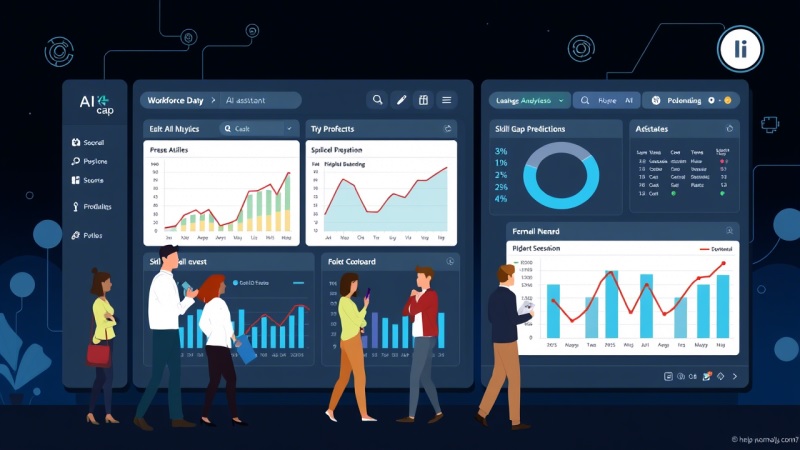The future of work is no longer a distant concept—it is unfolding before us, shaped by rapid technological advancement, global competition, and shifting employee expectations.
In this evolving landscape, Digital Leadership Skills have emerged as the foundation upon which organizational success is built. No longer limited to technical know-how, digital leadership is about inspiring people, driving innovation, and ensuring that companies thrive in uncertain and fast-changing environments.
This article explores why Digital Leadership Skills are indispensable in the future of work and how organizations can strategically cultivate them to secure long-term success.

Defining Digital Leadership Skills
Digital Leadership Skills represent a blend of traditional leadership capabilities with digital fluency, adaptability, and visionary thinking. Unlike conventional leadership, which often emphasizes stability and operational efficiency, digital leadership focuses on transformation, agility, and creating value in digital-first ecosystems.
Key attributes of digital leadership include:
Digital Fluency: Understanding emerging technologies and their business applications.
Agility and Adaptability: Responding quickly to disruptions and seizing opportunities.
Empathy and Emotional Intelligence: Leading people with awareness and sensitivity in hybrid and remote work environments.
Visionary Thinking: Anticipating trends and setting long-term strategies.
Data-Driven Decision-Making: Leveraging analytics and insights to make informed choices.
The Future of Work: A Paradigm Shift
The workplace of the future is defined by continuous change. Several forces are reshaping work dynamics:
Technological Advancements: Artificial intelligence, automation, and cloud computing are redefining how tasks are performed.
Remote and Hybrid Work Models: Digital collaboration tools have made flexible work the norm.
Evolving Employee Expectations: The workforce now prioritizes purpose, innovation, and growth opportunities.
Globalization and Competition: Organizations must innovate to compete on a global scale.
To succeed in this environment, leaders must go beyond traditional management practices. Digital Leadership Skills are the bridge that connects strategy, people, and technology in a holistic way.

Why Digital Leadership Skills Are the Cornerstone of Success
Driving Innovation and Growth
Innovation is no longer optional—it is the lifeline of modern organizations. Leaders with strong Digital Leadership Skills foster a culture of experimentation, encourage creativity, and integrate technology to fuel sustainable growth.
Navigating Uncertainty
The digital age is characterized by volatility. Leaders who master digital fluency can navigate disruptions, whether caused by technological changes, global crises, or shifting market conditions.
Building Agile and Resilient Organizations
Agility has become synonymous with survival. Leaders with digital expertise empower teams to pivot quickly, adopt new tools, and embrace continuous learning, ensuring resilience against external shocks.
Enhancing Employee Engagement and Retention
In hybrid workplaces, employee engagement requires more than incentives. Digital leaders leverage emotional intelligence, digital tools, and inclusive communication strategies to retain top talent and strengthen organizational culture.
Achieving Competitive Advantage
Organizations that integrate Digital Leadership Skills at every level are better positioned to differentiate themselves in the market. By combining technology with visionary leadership, they gain a sustainable competitive edge.
Cultivating Digital Leadership Skills in Organizations
Embedding Digital Literacy Across All Levels
Digital literacy should not be confined to IT teams—it must extend to leaders across functions. Organizations can conduct training programs and workshops to build baseline digital fluency.
Leadership Development Programs
Targeted Digital Leadership Training programs that combine technical skills with leadership development ensure future-ready leaders. These programs may focus on topics such as artificial intelligence, data analytics, change management, and innovation strategy.
Creating a Culture of Continuous Learning
Digital leaders must be lifelong learners. Encouraging a growth mindset across the organization empowers employees and leaders alike to adapt to emerging technologies and market trends.
Encouraging Experimentation and Risk-Taking
Innovation thrives where leaders allow experimentation. By promoting psychological safety, leaders give teams the freedom to test new ideas without fear of failure.
Leveraging Mentorship and Peer Learning
Organizations can accelerate leadership development by pairing emerging leaders with experienced digital leaders, creating knowledge-sharing ecosystems.

Real-World Insights: Lessons from Global Practices
Many organizations worldwide have demonstrated how Digital Leadership Skills create measurable impact. For example:
A multinational technology company (Company X) developed a leadership academy focused on digital transformation, resulting in higher innovation rates and employee satisfaction.
A mid-sized manufacturing firm (Company Y) embraced digital leadership training, which enabled leaders to introduce automation and reduce operational costs by 25%.
A financial services provider (Company Z) leveraged digital leadership to expand hybrid working models, enhancing both productivity and work-life balance.
These cases demonstrate that the effective application of digital leadership directly contributes to organizational resilience, growth, and long-term competitiveness.
The Link Between Digital Leadership and Organizational Culture
Organizational culture is one of the most critical success factors in digital transformation. Leaders with Digital Leadership Skills shape cultures that embrace change, foster collaboration, and promote innovation. A strong culture, in turn, accelerates the adoption of digital initiatives and creates alignment across departments.
Overcoming Challenges in Building Digital Leadership
While the benefits are clear, organizations often face challenges such as:
- Resistance to change from traditional leaders.
- Lack of clarity in digital transformation strategies.
- Gaps in training resources.
- Overemphasis on technology without developing people.
To overcome these barriers, companies must adopt holistic approaches that combine technology, people, and strategy under visionary leadership.
The Road Ahead: Preparing for the Digital Future
The future will bring even greater reliance on digital ecosystems. Organizations that fail to invest in Digital Leadership Skills risk losing relevance. By contrast, those that embed digital leadership into their DNA will:
Adapt faster to new technologies.
Lead innovation in their industries.
Empower employees to thrive in digital workplaces.
Build sustainable and competitive organizations.

FAQs: Digital Leadership Skills in the Future of Work
Q1: What are Digital Leadership Skills and why are they important?
Digital Leadership Skills combine traditional leadership qualities with digital fluency, adaptability, and visionary thinking, enabling leaders to thrive in fast-changing environments.
Q2: How can organizations develop Digital Leadership Skills?
Through leadership development programs, mentorship, continuous learning initiatives, and a culture that encourages experimentation and digital literacy.
Q3: What role do Digital Leadership Skills play in employee engagement?
They help leaders connect with teams in hybrid environments, foster inclusivity, and use digital tools to maintain communication and motivation.
Q4: Are Digital Leadership Skills relevant only for tech companies?
No. They are essential for all industries, from healthcare and finance to education and manufacturing, as digital transformation affects every sector.
Q5: How do Digital Leadership Skills provide competitive advantage?
They enable organizations to innovate faster, respond to market changes, and create cultures that embrace continuous improvement.
The future of work is being shaped by digital transformation, uncertainty, and evolving workforce dynamics. In this environment, Digital Leadership Skills are not a luxury—they are a necessity.
Leaders who combine digital fluency with emotional intelligence, agility, and visionary thinking will guide their organizations toward sustainable success. By cultivating these skills, companies position themselves to not only survive but thrive in the digital age.
We also advise you to read:
- Mastering Digital Leadership Skills: Proven Strategies to Build a Future-Ready Team Culture
- Digital Leadership Skills vs. Traditional Leadership: Key Differences Every Modern Leader Must Understand
- From Traditional Manager to Visionary Digital Leader: Mastering Digital Leadership Skills in a Rapidly Evolving Workplace










